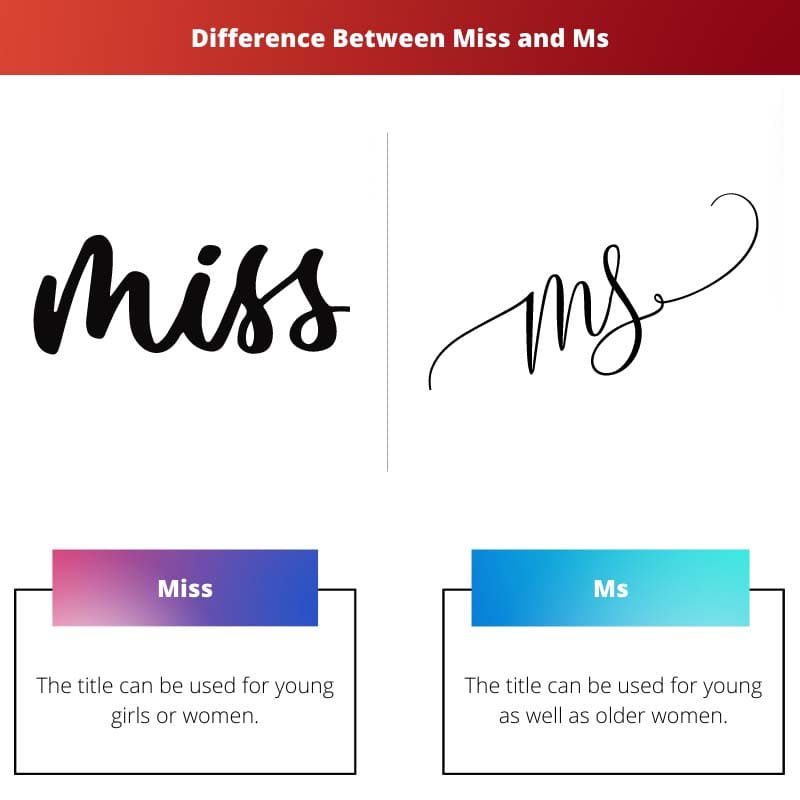Adding a title to a name is a form of respect. It qualifies identity, esteem, and a sense of self-value. There are specific rules that dictate the usage of titles before the names. Knowledge about formal titles can bring etiquette while addressing someone. The two most common formal titles used for women are Miss and Ms.
Key Takeaways
- Miss is used for unmarried women, while Ms can be used for both married and unmarried women.
- Miss is a title that indicates youth, while Ms is a title that indicates maturity.
- Miss is considered more informal than Ms, which is considered more formal.
Miss vs Ms
Miss is a title that addresses an unmarried woman or girl. It is used for younger women, particularly those who are not yet married. Ms. is a title used to address a woman regardless of her marital status. It is an abbreviation of Miss and Mrs used when the woman’s marital status is unknown.

Miss is added as a polite and respectful form of addressing. Miss is only used for unmarried women. Miss should be used only in cases where there is no doubt or dilemma about the woman’s marital status.
On the other hand, Ms can be used for all women. Ms is considered the appropriate title to be used professionally because of its neutral nature. It has no association with marital status. Ms can be used for both married and unmarried women.
Comparison Table
| Parameters of Comparison | Miss | Ms |
|---|---|---|
| Age group | The title can be used for young girls or women | The title can be used for young as well as older women |
| Usage | The title can be solely used for unmarried women | The title can be used for all women |
| Significance | Signifies that the woman is unmarried | Does not signify any marital status of the woman |
| Professional title | Miss is considered less professional as it is related to the marital status | Ms is considered the appropriate title to be used professionally because of its neutral nature |
| Pronunciation | Pronunciation of the term Miss is “Mis” | Pronunciation of the term Ms is “Miz” |
Who is Miss?
Miss is a formal title used to address young girls or women under the age of thirty, particularly unmarried. Miss has been the formal title for the longest time. Example – “Excuse me, Miss. You have dropped your pen”, “I have received my books, thank you, Miss,” or “We have invited Miss Joe to the party tomorrow.”
Traditionally the term miss was used for women who were in positions of power or authority. Professions like teachers or supervisors were addressed with Miss. Calling just by the first name would sound like disrespect, and thus, Miss was added as a polite and respectful form of addressing.
Miss can be used all by itself, especially during a term of address, or can be combined with the name during the description of a prominent characteristic or criteria that some person represents. Miss is an appropriate formal title in the contemporary world, especially for young women.
The recent standards of associating Miss refers to no indulgence of marital status during addressing. Some people associate the title Miss with affection. Some regions even associate miss as a prelude to chastisement while referring to young children. An example of such would be – “Clean your room, Miss, before the party begins.”

Who is Ms?
Ms is used as a formal title of respect for women who are above the age of 18. Ms is an appropriate title to be used before women whose marital status is unsure. The title signifies a neutral marital status. The formal title was first used in the 1950s. It gained prominence during the movement of Women in the 1970s.
Ms is the title that can be used even in a state of confusion or dilemma regarding the woman’s marital status. The title has gained popularity, especially among the feminist society. It is considered as a female equivalent of the formal title “Mr” or “Mister.” It signifies respect that is not associated with marital status. Ms is pronounced as “Miz.”
It is ideally used in places where confusion or dilemma about the person’s marital status continues. Many women consider Ms as the highest form of respect that does not indulge with marital status and promotes equality. Ms can be used by itself as a form of address or paired with the person’s name.
Professionally, Ms is an ideal way to address a person. However, newspapers and magazines avoid mistakes in titles by omitting them and referring to people by their full names. Example sentences of Ms – “It was lovely to meet you, Ms. Richard.”

Main Differences Between Miss and Ms
- Miss is used to address young women, while Ms is used for younger as well as older women.
- Miss signifies the unmarried marital status of the women, while Ms signifies a neutral marital status.
- Miss is a formal title that may not be safe in case of doubt in the marital status, while Ms is a formal title that is the safest in case of any doubt.
- Miss has an association with marital status, while Ms has no association with marital status.
- Miss is only used for unmarried women, while Ms can be used for both married and unmarried women.

- https://link.springer.com/article/10.1007/BF00287454
- https://journals.sagepub.com/doi/abs/10.1111/1471-6402.00101
- https://psycnet.apa.org/record/1990-57170-001
Last Updated : 13 July, 2023


Emma Smith holds an MA degree in English from Irvine Valley College. She has been a Journalist since 2002, writing articles on the English language, Sports, and Law. Read more about me on her bio page.

The origins and significance of Miss and Ms titles are exquisitely explained. It brings to light the importance of using the right title based on a woman’s marital status.
An insightful analysis of the historical significance and contemporary usage of the titles ‘Miss’ and ‘Ms’, which are overlooked in modern times. This post brings attention to their relevance.
This article imparts essential knowledge about the usage of ‘Miss’ and ‘Ms’, shedding light on the cultural and historical contexts that have shaped these formal titles.
The article beautifully distinguishes between Miss and Ms in terms of usage, pronunciation, professional titles, and what each signifies. It delves into the historical significance too.
Indeed, this is an insightful overview of how ‘Miss’ and ‘Ms’ have been used throughout history. The post meticulously details the correct usage of these titles.
The comparison table provides a clear understanding of the differences in usage and significance between ‘Miss’ and ‘Ms’, highlighting the importance of proper title usage for addressing women.
The formal titles Miss and Ms are integral in maintaining a respectful and professional form of addressing women. This post provides clarity on the usage of these titles.
The post displays a comprehensive breakdown of the differences and uses of the Miss and Ms titles on women. It is important for addressing women’s titles in an accurate manner.
It’s crucial to discern the differences between Miss and Ms when addressing women in various contexts. The post serves as a valuable guide in understanding these important titles.
Agreed, the post effectively delineates the nuances between Miss and Ms, offering a comprehensive guide for using these titles.